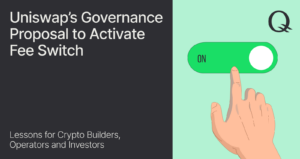The Q blockchain is maintained by a set of validators. They operate full nodes and sign blocks to validate transactions on Q. By rejecting invalid transactions, validators ensure the integrity of the Q blockchain.
Validators are compensated for the service which they provide to the network. The level of compensation is dependent on a number of factors — most importantly, the total amount of Q available for distribution and the amount of Q staked by the respective validator. As Q employs a delegated-proof-of-stake mechanism, validators can increase their clout by attracting stake delegations from other participants in the Q network. Validators can choose how much of the rewards they share with their delegates: The more they share, the more appealing they are to other Q token holders looking to delegate their stake. So to estimate the level of compensation, validators need to estimate their self-stake, the amount of delegated stake and the delegate’s share.
I regularly receive the same question from existing and aspiring validators: How much can I expect to earn from validating on the Q network?
To help answer this question, I have set up a tool — the Q Validator APR Calculator. You can use this to estimate the level of compensation which you can expect: Just go to the google sheet, fill in the relevant parameters and check out the resulting annual percentage rate (APR):

In the first section (Expected APR on newly staked Q), you can estimate total rewards and the expected APR from running a validator node. You can enter your self-stake, the stake delegations you expect to receive and the reward split between you and your delegates. The second section (“Avg. APR on current staked Q”) shows the average APR received by the current validator set.
A few words of caution: The model is somewhat simplified in that it only takes into account rewards resulting from inflation. There are other sources or rewards (transaction fees, integrated application fees) which are ignored here. Also, the model reflects the current state of Q — obviously, since Q is a living system, parameters will change in the future.
Lastly, this is a tool provided by the community for the community. My goal is to give validators a first idea of what to expect when validating on Q. It does not replace your own business case and I cannot give any guarantees that the model works correctly. Before committing resources to Q, I strongly encourage you to do your own research: Section 6.2 of the Q White Paper is a good intro to Q’s economics; Article 4 of the Q Constitution provides the details that determine validator compensation; and of course you can check out the current network stats on hq.q.org.
Happy validating!






Leave a Reply